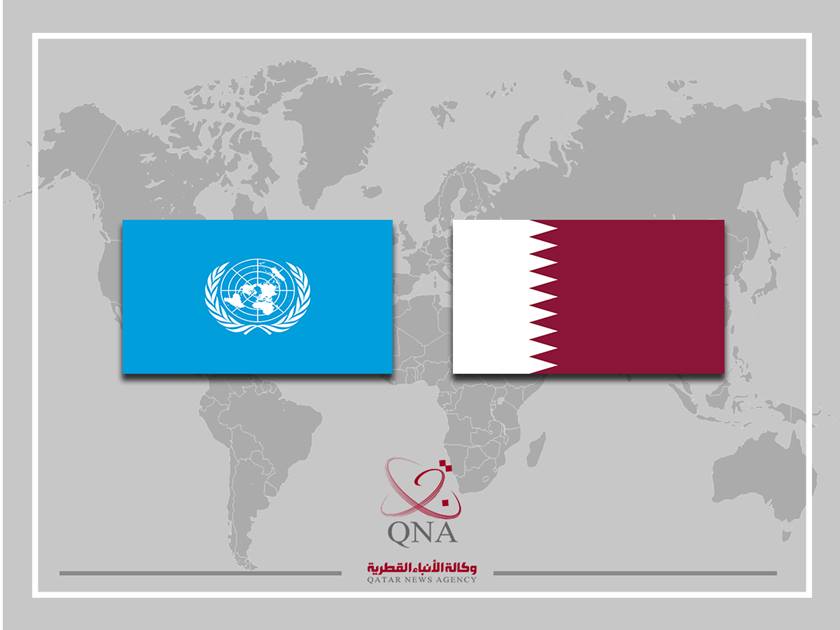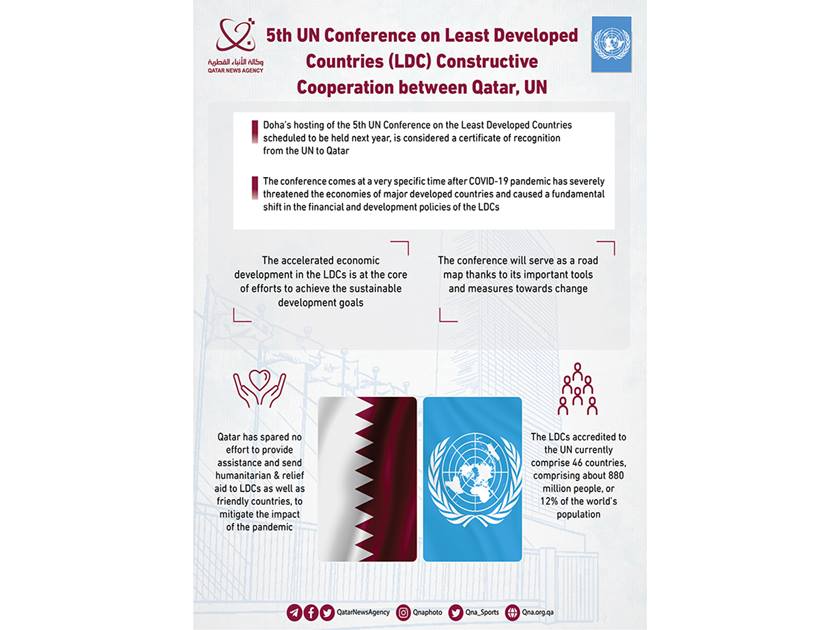Doha, September 17 (QNA) - The State of Qatar and the United Nations have had a long history of cooperation based on the success of Qatari diplomacy and confidence in Doha's ability to organize and sponsor major international events and conferences, or to host direct bilateral or multilateral negotiations for regional countries or provide humanitarian and relief initiatives in challenging times of crises and pandemics.
Doha's hosting and organizing of the 5th UN Conference on the Least Developed Countries (LDC-V) - scheduled to be held in March 2023, is considered as a certificate of recognition from the UN to Qatar and evidence of the international community's confidence in Doha as a capital with remarkable diplomatic weight.
The convening of the conference comes at an extremely critical time after the Coronavirus (COVID-19) pandemic has severely threatened the economies of major developed countries and caused a fundamental shift in the financial and development policies of the least developed countries in a way that affected their survival as countries capable of fulfilling their citizens' obligations let alone their international obligations.
In a speech HE Permanent Representative of Qatar to the United Nations Office at Geneva Dr. Hend Abdalrahman Al Muftah stressed the State of Qatar's firm support and solidarity with the least developed countries, and its keenness to make all efforts that would support these countries to achieve their legitimate aspirations for development and progress.
In her speech which was delivered during a side event organized by the permanent delegation of the State of Qatar, in cooperation with the Office of the High Commissioner for Human Rights to celebrate the anniversary of the adoption of the Doha Program of Action for Least Developed Countries, under the title" Challenges and opportunities related to human rights", Dr Hend added that based on the foreign policy of the State of Qatar, which attaches great importance to partnership with the international community, Qatar has had the honor to chair the 5th UN Conference on Least Developed Countries, which Doha will host the meetings of the second edition during period from March 5-9, 2023.
She said that the State of Qatar aspires for the Doha Work Program for Least Developed Countries to be widely followed and implemented, and to serve as a roadmap to achieve the pledge not to leave anyone behind.
HE Qatar's Permeant Representative to the United Nations Office at Geneva reiterated the "full commitment of the State of Qatar to continue its cooperation and solidarity with the least developed countries.
The United Nations Committee for Development Policy (CDP) uses the three criteria to determine the status of LDCs: individual income, human assets, and economic vulnerability. The COVID-19 pandemic, which struck the globe in late 2019, while its economic and health repercussions have continued to varying degrees, affected the three criteria significantly, which necessitated regional and international blocs to launch dozens of initiatives as an attempt to survive and recover again and achieve sustainable development goals for the post-pandemic stage.
The accelerated economic development in the least developed countries is at the core of efforts to achieve the sustainable development goals. Not only does it address the issues of widespread poverty and malnutrition in this group of countries, but the selection and implementation of effective policies to overcome these problems is the biggest challenge.
In a speech he delivered during the opening session of the first part of the 5th UN Conference on LDC, which was held in New York on March 17, HE Deputy Prime Minister and Minister of Foreign Affairs Sheikh Mohammed bin Abdulrahman Al-Thani said that, under the directives of HH the Amir, the State of Qatar initiated hosting the conference based on its policy on partnership with the international community, and in line with its commitment and keenness to support the issues of LDCs, in addition to Doha's confidence that this conference will contribute to meeting the needs and priorities of these countries, and support their path towards achieving development in the next ten years.
The UN, Doha's Program of Action (DPoA) for LDCs, which was approved by the UN, is regarded as a significant step for the success of the second part of the conference, which will be held in Doha, as it will be the first program of action to address the repercussions of the COVID-19 pandemic on LDCs by giving them the utmost priority.
The DPoA will serve as a roadmap, thanks to its important tools and measures towards change, as well as the reflection it brings upon the commitment of all partners to provide more resources and realize the full potential offered by science, technology, and innovation, leading to comprehensive development. The program would also serve as an effective tool for translating the totality of long-term promises and commitments into practical actions with the cooperation of all partners.
In his speech during the conference, UN Secretary-General Antonio Guterres described DPoA as a representation of a "lifeline", as it provides aid to the LDCs in the short term, achieves the goals of sustainable development in the medium term, and creates development and prosperity in the long term, saying: "The hopes, dreams, lives, and livelihoods of one-eighth of humanity rest between the pages of the Doha Program of Action."
Guterres noted that developing countries need to invest in sectors that reduce poverty and increase resilience, such as job-creation, social protection, food security, universal healthcare, quality education and digital connectivity.
Hope rests on the DPoA through transforming it into a framework that includes commitments from the major countries with a package of debt relief, as well as financial and development aid for LDCs to face the post-COVID-19 era, in addition to the economic stagnation that the world may witness with the continuation of military operations in Ukraine, the suspension of supply chains, the high prices, and the scarcity of raw materials.
HE Permanent Representative of Qatar to the United Nations Office at Geneva, Dr. Hend Abdalrahman Al Muftah also noted that the pledge to "leave no one behind" is the core pledge that Member States of the United Nations made when adopting the 2030 Agenda for Sustainable Development, and this commitment means taking all possible measures to eradicate poverty, end inequalities, and confront discrimination, taking the necessary measures and reaching those furthest behind first, stressing that this obligation applies not only to people, but also to states.
HE Dr Hend added that this commitment also means that the implementation of the sustainable development goals must take into account the specific needs of vulnerable countries, including the least developed countries, so that they can build sustainable, resilient and inclusive economic growth.
The State of Qatar has spared no effort to provide assistance and send humanitarian and relief aid to LDCs as well as friendly and brotherly countries, to mitigate the impact of the Coronavirus (COVID-19) pandemic on the economic growth plans of those countries.
Doha has made contributions that exceeded USD 140 million, based on its leading role in humanitarian work and in support of international efforts to combat the pandemic, and signed a basic contribution agreement with the World Health Organization (WHO) worth USD 10 million to support the organization's program of action and the initiative to accelerate the availability of tools to combat COVID-19 in the countries most in need.
Through Qatar Fund for Development (QFFD), the State of Qatar also contributed to aiding 92 countries during the pandemic, based on its belief in the importance of global solidarity to overcome the effects of the scourge, especially on LDCs.
Qatar is the first Arab and Gulf state to organize and host the UN Conference for LDC-V. The First UN Conference on the Least Developed Countries was held in Paris in 1981 in order to shed global attention and take measures to reverse the ongoing deterioration in the social and economic situation of the most vulnerable countries. The conference adopted a fundamental new comprehensive program of action in the 1980s for the benefit of LDCs.
The Second UN Conference on the LDCs was also held in Paris in 1990, to continue focusing on the need for special measures for these countries. It resulted in the adoption of the 'Paris Declaration and Program of Action for the Least Developed Countries for the 1990s'.
In 2001, the Third UN Conference for LDCs was held in Brussels, hosted by the European Union, where the 'Brussels Program of Action for the LDCs for the Decade 2001-2010' was adopted.
After the 3rd Conference on LDCs, the UN General Assembly (UNGA) established the 'United Nations Office of the High Representative for the Least Developed Countries, Landlocked Developing Countries and Small Island Developing States.'
In 2008, UNGA decided to hold the Fourth UN Conference for LDCs, which took place three years later in Istanbul, from May 9-13, 2011, with the aim to assess the implementation by the least developed countries and their development partners of the Brussels Program of Action.
The preparation for the conference in its fifth edition in Doha began immediately after signing the Doha hosting agreement on Oct. 4, 2021, which took place at the UN headquarters in New York.
In early March 2022, the UN adopted a resolution submitted by the Group of 77 and China, in which it set the dates for the LDC-V Conference under the item 'Further modalities of the 5th United Nations Conference on the Least Developed Countries', to be at the highest level in the presence of heads of state and government.
The UN list of the least developed countries (LDCs) currently includes 46 countries with nearly 880 million people, or 12 percent of the world's population. These countries face serious structural impediments to growth and represent less than 2 percent of the global Gross Domestic Product (GDP), and about 1 percent of global trade.
The UN's Committee for Development Policy (CDP) reviews the list of LDCs every three years. The list includes Afghanistan, Angola, Bangladesh, Benin, Bhutan, Burkina Faso, Burundi, Cambodia, Central African Republic, Chad, Comoros, Democratic Republic of the Congo, Djibouti, Eritrea, Ethiopia, in addition to Gambia, Guinea, Guinea-Bissau, Haiti, Kiribati, Lao People's Democratic Republic, Lesotho, Liberia, Madagascar, Malawi, Mali, Mauritania, Mozambique, Myanmar, Nepal, Niger, Rwanda, Sao Tome and Principe, Senegal, as well as Sierra Leone, Solomon Islands, Somalia, South Sudan, Sudan, East Timor, Togo, Tuvalu, Uganda, United Republic of Tanzania, Yemen, and Zambia.
Six of the LDCs have developed enough to leave the list, namely: Botswana in 1994, Cape Verde in 2007, the Maldives in 2011, Samoa in 2014, Equatorial Guinea in 2017, and Vanuatu in 2020. Since 1971, the United Nations has recognized the LDCs as a category of extremely disadvantaged countries in their development process because of structural, historical, and geographical reasons.
More than other countries, LDCs face the risks of extreme poverty and underdevelopment, as more than 75 percent of the population of LDCs still lives in poverty. These countries also suffer vulnerability to external economic shocks, natural and manmade disasters, as well as infectious diseases, therefore, LDCs need the highest degree of attention from the international community.
The UN identifies LDCs on regular bases and highlights their structural programs in order to send a strong signal to the international community about the need for special concessions to support these countries. The concessions include financing for development efforts, particularly grants and loans from donors and financial institutions; a multilateral trading system, such as preferential access to markets and special transactions; and technical support, particularly for trade mainstreaming. (QNA)



